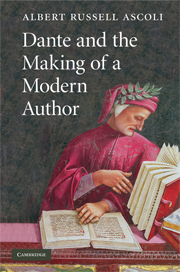Book contents
Chapter 1 - The author in history
Published online by Cambridge University Press: 22 September 2009
Summary
Dante è un produttore di auctoritates. Culturalmente egli è un uomo del medio evo per il quale … la sentenza, il detto in cui si deposita la sapienza umana, è fonte di conoscenza non meno … che il ragionamento e l’esperienza diretta; salvo che, invece di limitarsi a incastonare e glossare detti memorabili … egli ne produce dei suoi, e conferisce lo stesso piglio legislativo a tutti i suoi enunciati.
(Contini 1965b: 76–7)WHAT IS AN “AUCTOR”?
From the perspective of the first decade of the twenty-first century, more than seven hundred years after the fictive date in which the events recounted in the Divina Commedia take place, it seems obvious that no single work and no writer in the Western canon possesses more authority, in a generalized sense of widely-acknowledged cultural prestige and ideological weight, than do Dante Alighieri and the “poema sacro” (“holy poem”; Par. 25.1) he began not long after his exile from Florence in 1301 and finished shortly before his death at the age of fifty-six in 1321. No work is more central to the Western canon and the educational and cultural apparatus that still actively propounds it, notwithstanding numerous recent contestations; no author possesses more “cultural capital.” From shortly after Dante's death, and perhaps even while he was still alive, the Commedia was recognized as a classic, comparable to the great poems of antiquity in a way that no other vernacular work of his era was.
- Type
- Chapter
- Information
- Dante and the Making of a Modern Author , pp. 3 - 64Publisher: Cambridge University PressPrint publication year: 2008

